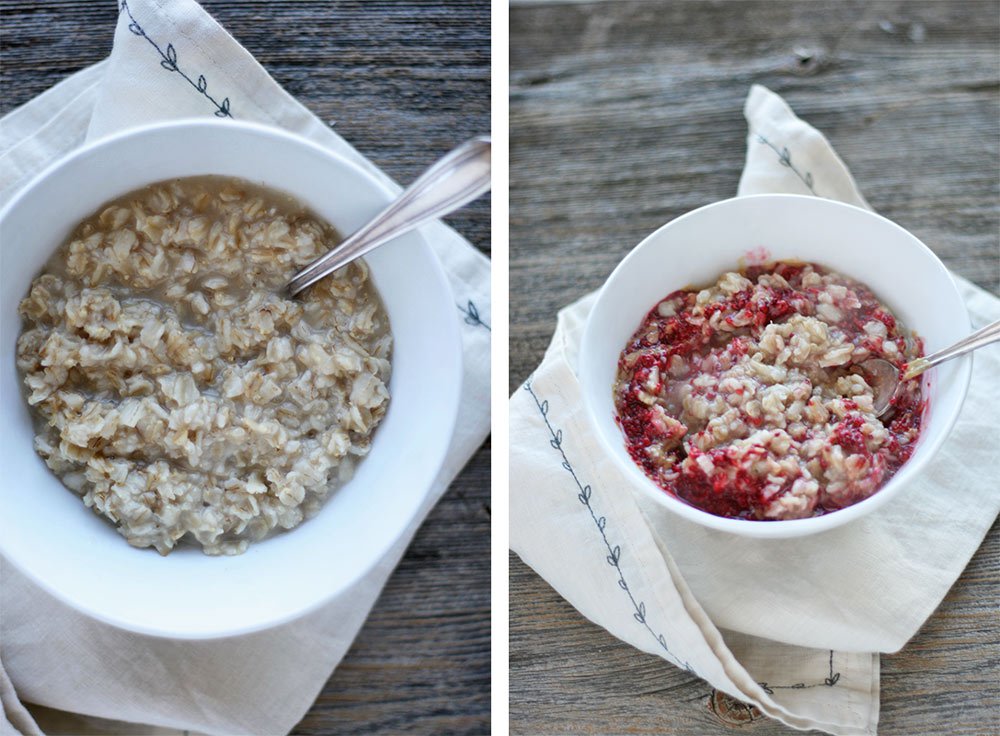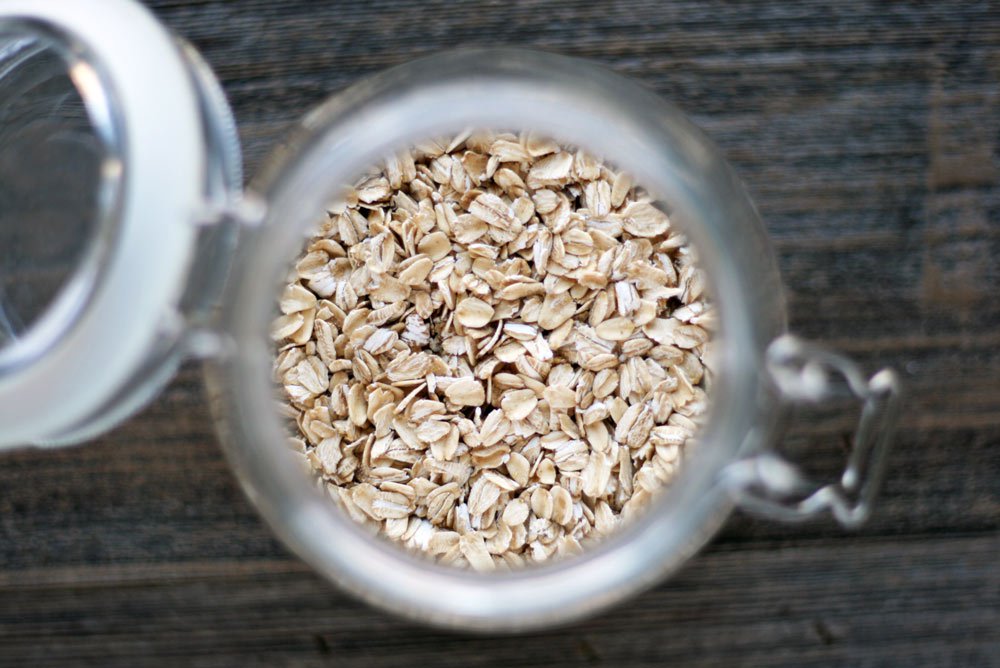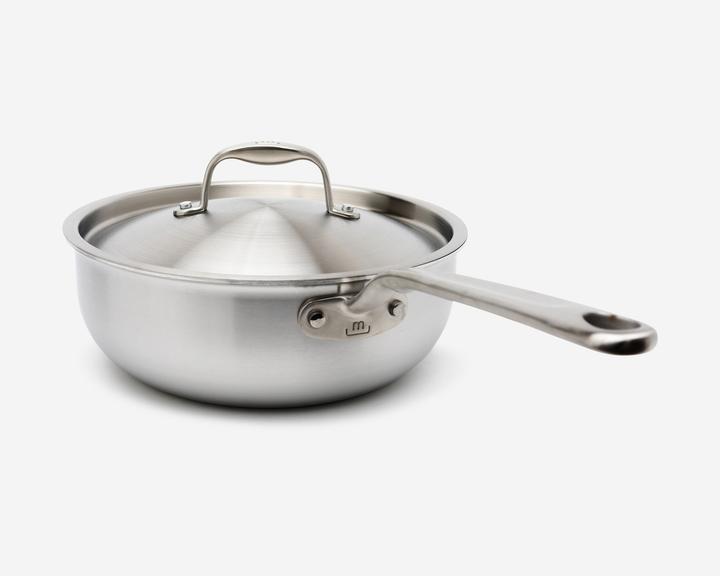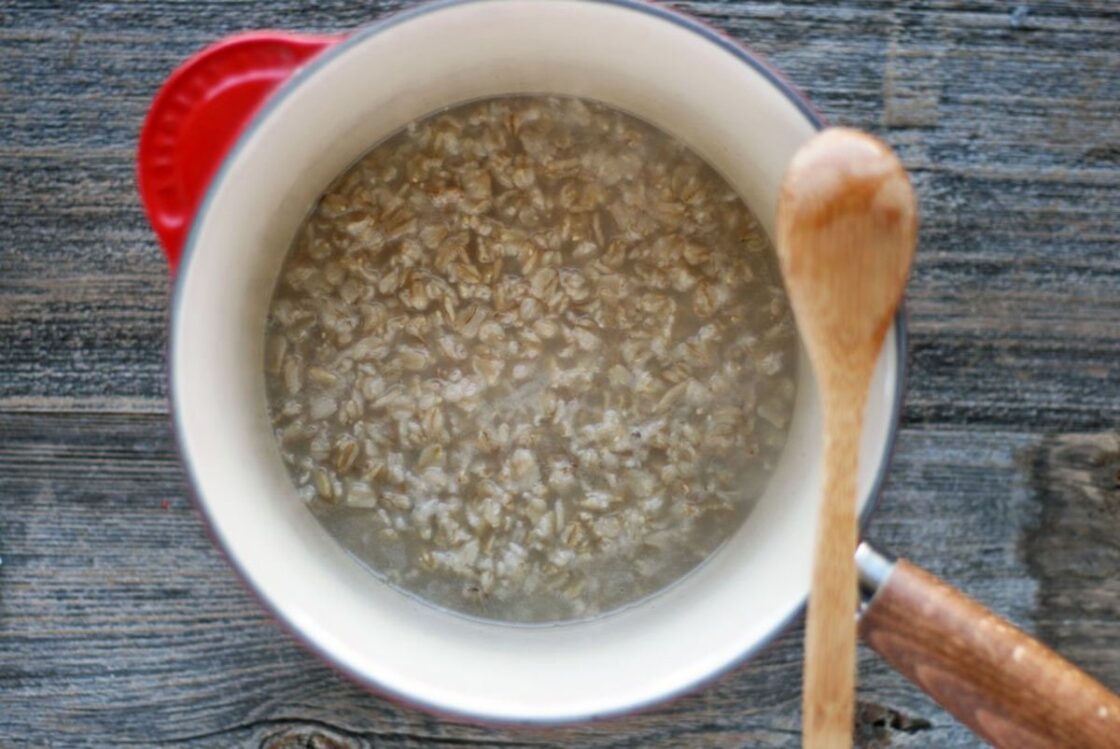How to Cook Delicious Oatmeal Every Time: Elevate Your Breakfast Game [Video]
Cooking delicious oatmeal starts with quality oats and the right tools. Here is the healthiest, easiest way to cook your oatmeal. No microwave and packet of sugary instant oats required.

*Affiliate disclosure
Comfort food isn’t always healthy (read: cheesy grits), so oatmeal is a welcome exception. With so many delicious ways to change up the flavors (cinnamon, cacao powder, peanut butter…) and such a variety of toppings to make each bowl unique (nuts, fruit, compote, poached eggs…) there is no better whole food bowl to start your day.

Consider this your one-stop shopping locale for everything you ever wanted to know about oatmeal… and a few things you didn’t know you needed to know, too!
Health Benefits of Oatmeal
Oats have been considered a healthy breakfast option for decades, and for good reason. Oats of all varieties are packed with a certain kind of soluble fiber known as beta glucan. This type of fiber is associated with reduced metabolic syndrome, a reduction in LDL cholesterol (the bad kind), decreased risk of heart disease, and improved digestive function.1
Starting off your day with a big bowl of oatmeal delivers even more health benefits. Oats contain unique antioxidant compounds called avenanthramides, which help to prevent free radical damage. 2
Oats (and other whole grains) keep your ticker healthy, too. Harvard researchers studying the effects of whole grain cereal consumption on heart failure risk followed 21,376 participants in the Physicians Health Study over nineteen years.3 “After adjusting for confounding factors, they found that men who consumed a daily bowl of whole grain (but not refined) cereal had a 29 percent lower risk of heart failure.”
One more health consideration to keep in mind when cooking your healthy eats: Make sure you choose and use clean, non-toxic cookware so chemicals don’t leach into your food. This is particularly important when it comes to non stick cookware. To discover which brands are safe read our guide to non-toxic cookware.
Nutrient breakdown of Oats: 1 cup dry, 81g
Thiamine: 25% DV
Folate: 6% DV
Iron: 19% DV
Magnesium: 28% DV
Phosphorus: 33% DV
Zinc: 20% DV
Copper: 16% DV
Manganese: 147% DV
Selenium: 33% DV

The 5 Different Types of Oatmeal
Due to different forms of processing you can find a variety of oat types at the grocery store. Of course, some oats are healthier and more whole than others.
Here’s the breakdown:
1. Rolled Oats or Old Fashioned Oats
Also called old-fashioned, traditional, or whole oats, these oats have a flatter shape due to being steamed and then rolled to flatten. Rolled oats cook faster than steel-cut oats and are ideal to use in cookies, muffins, granola bars, and quick breads. They can easily be ground into an oat flour, and absorb more liquid than other types of oats.
2. Steel-Cut Oats
These oats are produced by cutting whole oat groats with steel blades. Also known as Irish oatmeal, they have a thick and chewy texture once cooked. These oats are delicious cooked into a morning porridge or baked into heartier meals like stuffing and risotto.
3. Instant Oats
Also called quick-cooking oats, instant oats are the most processed type of oatmeal. This oatmeal is made by partially cooking the grains before rolling them into a thin finished product. Often, sugar, salt and other ingredients are added.
This type of oat is best made into a quick porridge, which will tend to have a mushier texture than other less processed oatmeal types.
4. Oat Groats
The word “groat” comes from an old Scottish word describing an oat kernel with the hull removed. This type of oat is otherwise unprocessed and uncut, and it takes longer to cook. That said, it delivers a hearty and chewy taste and texture as its reward.
Oat groats can be cooked into porridge or used for heartier grain dishes in place of quinoa or rice.
5. Sprouted Oats
These are simply rolled or steel-cut oats that have been soaked, sprouted, and dehydrated.
Oats contain phytic acid3, a compound that can interfere with nutrient absorption in the GI tract. Soaking and sprouting significantly reduces the amount of phytic acid in oats, as does cooking them.
If you can’t find sprouted oats in your grocery store, you can also soak your oats with an acidic compound overnight (one cup oats + one cup water + two tablespoons apple cider vinegar, lemon juice, or yogurt). The acid helps to break down the phytic acid found naturally in the oats (see the Organic Authority shop for Little Apple Treats apple cider vinegar made from orchard-grown, hand picked organic fruit). Simply pour this mixture into your pot and cook away!
[Note: many foods naturally contain phytic acid. This is not really a concern unless you have special health conditions or food restrictions. If you are concerned about phytic acid, talk to your nutritionist, RD, ND, or MD.]
Here’s the Healthiest Way to Cook Your Oatmeal
Now that you know how amazing oatmeal is for your health, and the right types of oats to choose, it’s time to make yourself a bowl. This method calls for organic rolled oats. Cooking oatmeal is easy with the right tools and ingredients
Step 1. Gather your cooking tools and supplies.

We love using Made In’s 3 quart stainless steel saucier to batch make oatmeal on the weekends.
You’ll need a medium sized pot, rolled oats, measuring cups, a pinch of sea salt, a wooden spoon, and water.
Step 2: Measure the correct ration of water to oatmeal.
To make one serving of oats you’ll need ½ cup rolled oats, 1 ¼ cup water, and a pinch of sea salt.
Tip: Yes, cook your oats in water, not milk. Doing so ensures a creamier texture. If you’d like, add in a splash of milk (dairy or nondairy) at the end of the cooking process.
Tools of the trade: We use, and recommend, the beautiful three quart saucier from Made In. Built to last hardly begins to describe it. With 5-ply construction, this piece is both durable and well-designed. You’ll notice how evenly it cooks, and we love the rounded sides because they help prevent food from sticking (you’ll find yourself using this saucepan for everything from risotto to red curry sauce).
3. Bring the water for your oatmeal to a rolling boil.

Add water to your pot over high heat. Bring water to a rolling boil and then stir in rolled oats and a pinch of sea salt.
Tip: I love to add in pink Himalayan sea salt for a boost of naturally occurring minerals. Cooking oats with salt is essential; it provides flavoring and allows the oat grain to open up and fully cook.
4. Reduce heat and stir your oatmeal.

Reduce the heat to medium-low and stir every so often, until oats become plump and thickened, about 10-15 minutes.
Tip: During this time, feel free to stir in your sweetener of choice or seasonings. If the oats are a bit too watery for my liking, I also like to add in a tablespoon of chia or ground flax seeds to thicken up the consistency.
5. Pour your oatmeal into a bowl and devour!

Pour cooked oats into a deep bowl and garnish with toppings and spices. See our favorites below. In this recipe I’m topping my bowl with gently warmed raspberry chia seed jam, cinnamon, and creamy peanut butter.
Tip: Once pouring your oats into a bowl, immediately soak your pot with hot water and soap. Leaving oats in the pot is a recipe for a dishwashing nightmare.
Bonus: Here’s How to Elevate Your Basic Bowl of Oatmeal

Cooked oats are a bit too Plain Jane without fun toppings and flavor combinations. Here are some favorite spices, flavors, and additions to make the best bowl of oatmeal ever.
Spices: stir in a few dashes of desired spice to your pot of oatmeal before serving. Try cinnamon, cardamom, nutmeg, ginger, turmeric, or pumpkin pie spice.
Sweeteners: Add a drizzle of something sweet to brighten up your bowl, like raw honey, maple syrup, coconut sugar, blackstrap molasses, or date syrup.
Dried fruit: Chose no sugar and no oil added varieties of raisins, dates, figs, goji berries, golden berries, cranberries, or tart cherries.
Superfoods: Chia seeds, coconut flakes, cacao powder, maca powder, mushroom powders, full-fat yogurt or coconut yogurt, etc.
Fruit: Fresh or frozen berries, banana slices, diced and cooked apple, stone fruits, pear, etc.
Nuts and seeds: Almonds, walnuts, cashews, pecans, sunflower seeds, pumpkin seeds, etc.
Nut butters: Peanut butter, almond butter, tahini, sunflower butter, cashew butter, coconut butter, etc.
Savory: Add a poached egg, Parmesan cheese, a sprinkle of black pepper, sautéed spinach with garlic, and cooked sweet potatoes for a totally different take on standard oatmeal.
Notes for Cooking Gluten-Free Oatmeal
Gluten-Free: If you are sensitive or allergic to gluten, make sure to purchase certified gluten-free oats. Oats are naturally gluten-free, but are often processed in a plant that also handles gluten-containing grains. To be on the safe side, purchase gluten-free rolled oats for peace of mind.
Get social with us!
Making oatmeal? Tag and show us on Instagram, Facebook, or Twitter with the tag #BeOrganic @OrganicAuthority – We can’t wait to get social with you!
Related On Organic Authority
6 Oatmeal Recipe Upgrades You Have To Try
Easy Steel Cut Oatmeal Recipe with Coconut Oil and Cinnamon: Wake Right Up!
This Baked Berry Oatmeal Recipe Will Warm Up Any Breakfast Rut
Sources
1. http://www.mayoclinic.org/diseases-conditions/high-blood-cholesterol/in-depth/cholesterol/art-20045192
2. https://academic.oup.com/jn/article/137/6/1375/4664754
3. https://www.mindbodygreen.com/0-30144/the-one-goodforyourgut-ingredient-you-should-be-adding-to-your-overnight-oats.html
4. https://www.mcgill.ca/oss/article/health-and-nutrition-quackery-you-asked/himalayan-pink-salt
*This article contains affiliate links that are independently sourced and vetted by our editorial team which we may earn a commission on. This helps us reduce the number of ads onsite and create a better user experience. We are here to help you navigate the overwhelming world of consumer products to source and uncover thoughtfully made, conscious clean products.

